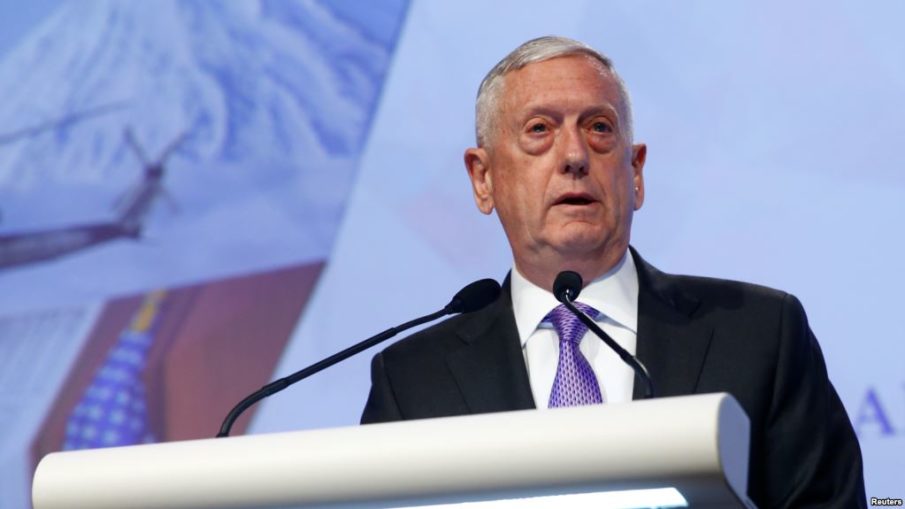American Defense Secretary James Mattis joined other regional defense leaders at a meeting of the heads of the Association of Southeast Asia Nations on Sunday, wherein the defense officials had a “robust” exchange of views on security and stability in Asia. The brief meeting was held on the sidelines of the larger Shangri-La Dialogue Asia security conference being held in Singapore.
Mattis took the opportunity to discuss ongoing concerns maintained by the United States and its allies regarding nuclear and ballistic weapons programs in North Korea and the freedom of trade and transit throughout contested waterways like the South China Sea.
I note up front that in the security arena we have a deep and abiding commitment to reinforcing the rules-based international order. This order, as we all know, is a product. It’s a true product of so many nations’ efforts to create stability. And these efforts, we must remind ourselves so we don’t take them for granted, these efforts grew out of lessons learned the hard way from an economic depression and catastrophic wars,” Mattis urged attendees.
China has been a particularly vocal critic of the United States in the Pacific, as America’s Navy serves as the primary force keeping Chinese military expansion in the South China Sea at bay. The waterway serves as a vital shipping area for international commerce, seeing over $5 trillion worth of goods shipped though the region per year, and also harbors valuable natural resources like natural gas and fish. As China has expanded its military equipment and personnel throughout the South China Sea, it has accused the United States of attempting to impose its will in the region though its own military presence.
“The international order was not imposed on other nations. Rather, the order is based on principles that were embraced by nations trying to create a better world and restore hope to all.”
Mattis reaffirmed the importance of protecting free travel and trade throughout contested Asian waterways before moving on to North Korea, quoting the Vice President in calling it, “the most urgent and dangerous threat to peace and security in the Asia-Pacific.”
While the North Korean regime has a long record of murder of diplomats, of kidnapping innocents, of killing of sailors, other criminal activity, its nuclear weapons program is maturing is a threat to all. Coupled with reckless proclamations, the current North Korean program signals a clear intent to acquire nuclear arm ballistic missiles, including those of intercontinental range that pose direct and immediate threats to our regional allies, our partners and all the world.”
Despite strained relations with China, Mattis made sure to include them in his declaration of consensus in the international community regarding a denuclearized Korean peninsula.
China’s declared policy of a denuclearized Korean Peninsula is our policy as well, and also that of Japan and the Republic of Korea. All nations represented in this room share an interest in restoring stability.”
He then went on to address China’s significant economic and political influence over North Korea as its primary ally and international trade partner. China has repeatedly stated that they don’t believe their influence can or should be the deciding factor in North Korean relations.
Ultimately, we believe China will come to recognize North Korea as a strategic liability, not an asset. A liability inciting increased disharmony and causing peace-loving populations in the region to increase defense spending.”
Already have an account? Sign In
Two ways to continue to read this article.
Subscribe
$1.99
every 4 weeks
- Unlimited access to all articles
- Support independent journalism
- Ad-free reading experience
Subscribe Now
Recurring Monthly. Cancel Anytime.
While drawing a tough line on China regarding North Korea, Mattis also addressed the elephant in the room: the potential for conflict between the U.S. and China as a result of economic competition and political posturing.
We welcome China’s economic development. However, we can also anticipate economic and political friction between the United States and China. Yet, we cannot accept Chinese actions that impinge on the interests of the international community, undermining the rules-based order that has benefitted all countries represented here today, including and especially China.” Mattis said.
“While competition between the U.S. and China, the world’s two largest economies, is bound to occur, conflict is not inevitable. Our two countries can and do cooperate for mutual benefit. And we will pledge to work closely with China where we share common cause.”
Despite what could be seen as a bit of an olive branch, Mattis tempered his calls for cooperation with a stern declaration of the U.S.’ intent in the region.
We oppose countries militarizing artificial islands and enforcing excessive maritime claims unsupported by international law. We cannot and will not accept unilateral coercive changes to the status quo.”
Image courtesy of Reuters










COMMENTS